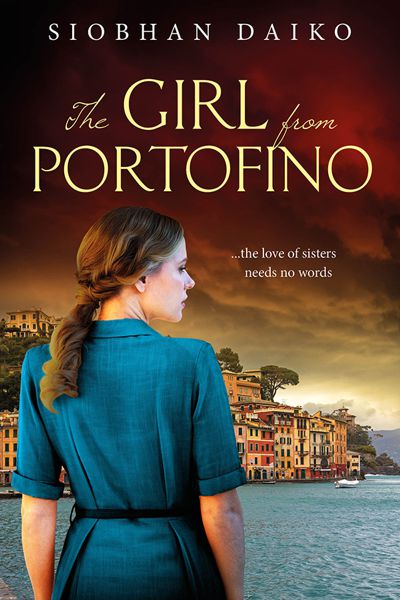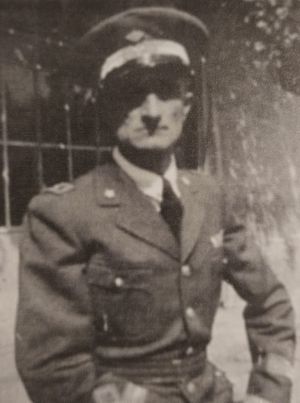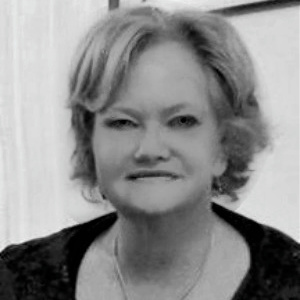
In 1970 Gina Bianchi returns to Portofino to attend her father’s funeral, accompanied by her troubled twenty-four-year-old daughter, Hope. There, Gina is beset by vivid memories of World War 2, a time when she fought with the Italian Resistance and her twin sister, Adele, worked for the Germans.
In her childhood bedroom, Gina reads Adele’s diary, left behind during the war. As Gina learns the devastating truth about her sister, she’s compelled to face the harsh brutality of her own past. Will she finally lay her demons to rest, or will they end up destroying her and the family she loves?
A hauntingly epic read that will sweep you away to the beauty of the Italian Riviera and the rugged mountains of its hinterland. “The Girl from Portofino” is a story about heart-wrenching loss and uplifting courage, love, loyalty, and secrets untold.

Italian Fascist Colonel Felice Fiorentini, notorious war criminal
One of the villains in “The Girl from Portofino” is the notorious Italian Fascist Colonel Felice Fiorentini, the most notorious war criminal in the Italian province of Pavia.
Felice Fiorentini was born in Milan on August 2, 1894. He served as an officer of the Bersaglieri during World War One, and then joined the Air Force where he reached the rank of colonel.

In July 1943 Fiorentini took over command of the special police, the Sicherheits, at a time when the partisan formations had increased in strength and the civil war between the fascists and anti-fascists had reached a new level of cruelty. The scorching of Nivione by Fiorentini and his men features in my book, “The Girl from Portofino.” Burnings of entire mountain and hill towns, where partisans often found refuge and hospitality, were a favourite method used by Fiorentini to oppress, humiliate, ill-treat, and terrify the local population.
In September 1944, the special police moved to Broni and set up its headquarters in the former Savoia hotel, renamed Villa Nuova Italia. The stables were turned into a prison and many anti-fascists were imprisoned and tortured there.
During the “ten months of hell” during which the special police occupied Broni, their numbers was augmented by fascists who had been exiled from central Italy, especially from liberated Tuscany. In November 1944, two more Sicherheits headquarters were established in Cicognola and Stradella. The infamous well, the pozzo di Cicognola, was where captured partisans and other political prisoners were incarcerated until they died of starvation and thirst. Its narrow circumference wouldn’t allow a prisoner to lie down, sit, or even lean away from an upright position. They just stood…and stood…until death claimed them.
Violence perpetrated by Fiorentini’s men escalated and there were almost daily incidents. Between Christmas day and December 31st eleven deaths and twenty arrests took place. Fiorentini carried on his despicable acts right up until the end of the war.
On the night of April 25, in a climate of general demobilization and “sauve qui peut”, Fiorentini commanded his orderly to destroy the departmental documents. After trying to resist the partisan forces, on the afternoon of April 26th, Fiorentini abandoned Stradella. Initially. He hid in a retreating German armoured column. While attempting to find passage across the river Po, he was recognised and narrowly escaped being lynched. To protect him from the anger of locals, partisan leaders placed him in a wooden cage on the back of an open lorry to receive the insults of the populace—who hurled abuse, spat at him, and demanded that he be hung forthwith.
On the 2nd May the colonel was eventually transferred to Voghera, to the former Fascist Headquarters, for a summary trial. There, the partisan priest Don Rino Cristiani calmed the crowd who were clamouring for his immediate death. Don Rino is a character in my novel and I portrayed him as close to life as possible. He stayed with Fiorentini during the final hours of his life, confessed him and listened to his last words.
James Wilde, the escaped British POW who fought with the partisans and who inspired the hero of “The Girl from Portofino,” was present at Fiorentini’s execution by firing squad. He confirmed that, after Don Rino heard his confession, Fiorentini turned to the partisans and shouted: “I was wrong, and I am ready to receive what I deserved”.
Fiorentini was taken to the Piane di Varzi, to a grass verge where he had previously ordered three partisans to be shot in a reprisal. He was granted a last cigarette and allowed to command the firing squad himself. Fiorentini was executed on May 3, 1945, at 1.30 pm, shouting the words “Viva l’Italia”.
Available on KindleUnlimited.
Amazon UK: https://siobhandaikoasolandobooks.com/3zJgr8N
Amazon US: https://siobhandaikoasolandobooks.com/3udwVEQ
Amazon CA: https://siobhandaikoasolandobooks.com/39zCHH
Amazon AU: https://siobhandaikoasolandobooks.com/2XQPIKJ
Meet Siobhan Daiko

Siobhan Daiko is a British historical fiction author. A lover of all things Italian, she lives in the Veneto region of northern Italy with her husband, a Havanese dog and two rescued cats. After a life of romance and adventure in Hong Kong, Australia and the UK, Siobhan now spends her time, when she isn’t writing, enjoying her life near Venice.
Connect with Siobhan
Website: https://siobhandaiko.org
Twitter: https://twitter.com/siobhandaiko
Facebook: https://www.facebook.com/SiobhanDaikoAsolandoBooks
LinkedIn: https://www.linkedin.com/in/siobhan-daiko-74993651/
Instagram: https://www.instagram.com/siobhandaiko_asolandobooks/
Pinterest: https://www.pinterest.it/SiobhanDaiko/_saved/
Book Bub: https://www.bookbub.com/authors/siobhan-daiko
Amazon Author Page: author.to/SiobhanDaiko
Goodreads: https://www.goodreads.com/author/show/7091256.Siobhan_Daiko
Thank you so much for hosting “The Girl from Portofino”.
Thank you so much for hosting today’s blog tour stop for The Girl from Portofino. We really appreciate all that you do.
Mary Anne
The Coffee Pot Book Club